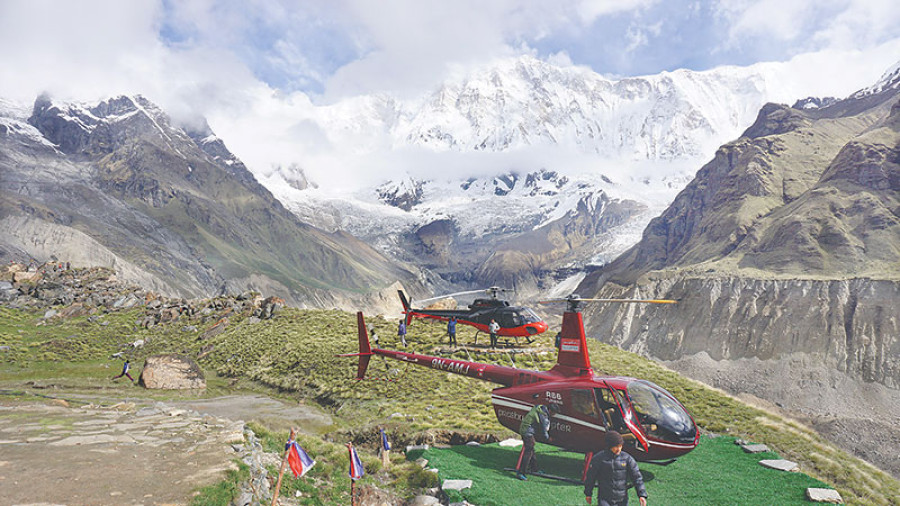Money
Govt moves to clamp down on helicopter rescue scam
The government has moved to clamp down on massive insurance fraud hatched by powerful brokers in trekking and mountaineering agencies in Nepal which involves bogus helicopter rescues and hospital treatment of tourists.
Sangam Prasain
The government has moved to clamp down on massive insurance fraud hatched by powerful brokers in trekking and mountaineering agencies in Nepal which involves bogus helicopter rescues and hospital treatment of tourists.
A government fact-finding committee submitted a 700-page probe report to Tourism Minister Rabindra Adhikari on Monday recommending that—from the next tourist season in September-November—all rescue activities be entrusted to the Nepal Police to stop the insurance scam that has damaged the country’s reputation.
“We are concerned by the bogus helicopter rescues and false medical insurance claims. In order to stop such offences, we have decided to entrust all tourist rescue-related tasks to the Nepal Police,” said Tourism Secretary Krishna Prasad Devkota. “We will prepare a working guideline related to the rescue operation and implement it from the autumn season,” he said, adding that the working procedure may need the Cabinet’s approval.
The fact-finding committee said in its report that it had formed its recommendations after studying rescue operations in France, Switzerland, Scotland and Canada.
There are widespread complaints that Nepal’s trekking and mountaineering agencies have been making claims against their customers’ tourist insurance policies for fake helicopter rescues. They have been accused of presenting fake bills for wide-ranging medical examinations for simple altitude-related headaches.
As many helicopter operators do not conduct rescue operations directly, ‘middlemen’ or trekking and mountaineering agencies arrange helicopter rescues and make fake private clinic bills on which they get a hefty commission, said a member of the fact-finding panel. “Making false travel insurance sickness claims when you are not ill is fraud, and there are many agencies involved in the illegal business in Nepal,” he said.
Unscrupulous operators have been pocketing thousands of dollars from insurance companies by making multiple claims for a single chopper ride or pushing trekkers to agree to airlifts for minor illnesses. The report has suggested that the Nepal Police should ask for a quote from helicopter companies and hospitals through open competition in accordance with the Public Procurement Act.
The police should make arrangements to claim reimbursement for medical and helicopter costs against the clients’ insurance policies. The report has urged the Nepal Police to set up a tourist rescue coordination unit at Tribhuvan International Airport in Kathmandu to provide services during the March-May and September-November peak tourist seasons. The unit will have a dedicated toll free telephone number to receive emergency calls.
Likewise, the report said that hospitals and clinics should provide details of the treatment provided to tourists to the Department of Tourism. The committee has suggested making it mandatory for tourists to go with a guide if they are trekking at elevations above 3,000 metres.
Trekking companies get hefty kickbacks when hikers are evacuated from the mountains. The committee said in its report that there have been widespread complaints of dishonest companies serving adulterated food to make tourists sick so that they can be evacuated by helicopter, and they can receive commissions from helicopter companies and hospitals and clinics.
“This is a crime, and such operators should be prosecuted by the Home Ministry under organized crime after necessary investigation if anyone lodges a complaint,” the report said.
The report has recommended action against five such companies that have not obtained a foreign exchange permit but have claimed rescue charges from tourists.
The names of the companies, however, have not been disclosed. It has also recommended action against six hospitals that have charged heavy fees for treating tourists and making claims against their insurance policies.
The committee report has urged the government to investigate the transactions of eight travel, trekking and rescue agencies, four hospitals and three helicopter companies for quoting exorbitant rates and making claims against tourist insurance policies. The committee has suspected that they may be involved in tax evasion.
The fact-finding panel probed 10 helicopter companies, six hospitals and 36 travel, trekking and rescue agencies following complaints filed by tourism entrepreneurs.




 12.12°C Kathmandu
12.12°C Kathmandu














